Wonderland Burlesque's
Let's All Go To The Movies
She's A Lady!
Part XIV
Sometimes? It takes a lady.
Or so these films would have us believe.
They promise lots of drama, the occasional comedy or musical, and a little bit of dirt!
Let's take a walk down Hollywood Blvd. and shine a light on these magnificent classic films.
This way, if you please. But remember...
Ladies first!
--- ---
Tarnished Lady
(1931)
Based on a short story by Donald Ogden Stewart, A Story of a New York Lady, this Pre-Code American drama was directed by George Cukor and stars Tallulah Bankhead, Clive Brook, and Phoebe Foster.
Tallulah Bankhead's first film after spending years on stage in New York and London. Though notorious for loving wild parties, rampant drug use and non-stop sex with men and women, she behaved herself on the set and filming went smoothly. But she found filmmaking to be very boring and did not have the patience for it. After over eight years of living in Great Britain and touring on their theatrical stages, she did not like living in Hollywood either. When she met producer Irving Thalberg, she asked him "How do you get laid in this dreadful place?" Thalberg retorted "I'm sure you'll have no problem. Ask anyone." - She did!
Mordaunt Hall of The New York Times observed, "Miss Bankhead acquits herself with considerable distinction, but the vehicle to which she lends her talent is no masterpiece. In fact, only in a few spots is the author's fine hand discernible."
Variety called it a "weepy and ragged melodrama [that] has little outside its cast to be recommended. Cast, as a whole, deports in a manner suggesting they were under orders to give way before Bankhead. Clive Brook suffers the most. Ordinarily a fine actor, he slumps here in trying to get over some of the silly dialog."
Cora Witherspoon's film debut.
--- ---
Ex-Lady
(1933)
Commercial artist Helen Bauer believes marriage kills romance. She lives with advertising writer Don Peterson. He convinces her to marry him. He later carries on with client Peggy Smith; Helen takes up with Don's competitor Nick Malvyn. In the end, the couple agree to give marriage another chance.
Based on the play of the same name by Edith Fitzgerald and Robert Riskin, this American pre-Code comedy/drama was directed by Robert Florey, and stars Bette Davis and Gene Raymond.
This is a remake of Illicit (1931), which starred Barbara Stanwyck.
Producer Darryl F. Zanuck handed this film to Robert Florey a couple of hours before the shooting was scheduled to begin. Florey didn't know if it was a comedy or a drama or what!
For the film, Davis was given the Hollywood glamor girl treatment, which she resented, feeling she "wasn’t the type to be glamorized". She was even more outraged over the marketing campaign for the film which "falsely pictured her as half-naked" on the film's posters, declaring that her shame was only exceeded by her fury. She hated this film and this part of her career so much that she admitted her “conscious tastefully avoided” all memories of this film.
Following this film's release, producer Darryl F. Zanuck left Warner Bros. to form 20th Century Pictures, which would later merge with Fox to become 20th Century-Fox.
The New York Times described the film as "an honestly written and truthfully enacted picture of the domestic problems which harass two persons in love with one another".
In 1962, producer-director Robert Aldrich was preparing the prologue to What Ever Happened to Baby Jane? (1962). He chose a scene from Parachute Jumper (1933) (Davis' least favorite film) and this film to document the fact that the young Jane was a flop as a movie star!
--- ---
Fatal Lady
(1936)
This American musical mystery was directed by Edward Ludwig and stars Walter Pidgeon, Mary Ellis and Ruth Donnelly.
Failing to find an audience, it recorded a loss of $296,665.
Final film of actress Virginia Lee .
Phantom Lady
(1944)
Unhappily married Scott Henderson spends the evening on a no-name basis with a hat-wearing woman he picked up in a bar. Returning home, he finds his wife strangled and becomes the prime suspect in her murder. Every effort to establish his alibi fails - oddly no one seems to remember seeing the phantom lady (or her hat). In prison, Scott gives up hope but his faithful secretary, Kansas, doggedly follows evanescent clues through shadowy nocturnal streets. Can she save Scott in time?
Based on the novel of the same name by Cornell Woolrich, this American film noir was directed by Robert Siodmak and stars Franchot Tone, Ella Raines, and Alan Curtis.
Although Franchot Tone is given top billing in this film, he does not appear until the 45 minute mark!
After the film's release, Jacques Press and Eddie Cherkose sued Universal for $20,000 for not getting on-screen credit for their song Chick-ee-Chick.
This was Siodmak's first Hollywood film noir. It was also the first producing credit by Joan Harrison, Universal Pictures' first female executive and a former screenwriter for Alfred Hitchcock.
Cliff's frantic drum solo was dubbed by former Harry James and His Orchestra drummer Dave Coleman.
Critic Bosley Crowther was not impressed with the atmospherics of the film and panned the film for its screenplay. "We wish we could recommend it as a perfect combination of the styles of the eminent Mr. Hitchcock and the old German psychological films, for that is plainly and precisely what it tries very hard to be. It is full of the play of light and shadow, of macabre atmosphere, of sharply realistic faces and dramatic injections of sound. People sit around in gloomy places looking blankly and silently into space, music blares forth from empty darkness, and odd characters turn up and disappear. It is all very studiously constructed for weird and disturbing effects. But, unfortunately, Miss Harrison and Mr. Siodmak forgot one basic thing - they forgot to provide their picture with a plausible, realistic plot."
Although Franchot Tone is given top billing in this film, he does not appear until the 45 minute mark!
This was Siodmak's first Hollywood film noir. It was also the first producing credit by Joan Harrison, Universal Pictures' first female executive and a former screenwriter for Alfred Hitchcock.
Cliff's frantic drum solo was dubbed by former Harry James and His Orchestra drummer Dave Coleman.
Critic Bosley Crowther was not impressed with the atmospherics of the film and panned the film for its screenplay. "We wish we could recommend it as a perfect combination of the styles of the eminent Mr. Hitchcock and the old German psychological films, for that is plainly and precisely what it tries very hard to be. It is full of the play of light and shadow, of macabre atmosphere, of sharply realistic faces and dramatic injections of sound. People sit around in gloomy places looking blankly and silently into space, music blares forth from empty darkness, and odd characters turn up and disappear. It is all very studiously constructed for weird and disturbing effects. But, unfortunately, Miss Harrison and Mr. Siodmak forgot one basic thing - they forgot to provide their picture with a plausible, realistic plot."
--- ---
Dishonored Lady
(1947)
AKA: Sins of Madeleine
Based on the 1930 play of the same name by Edward Sheldon and Margaret Ayer Barnes, this American film noir crime film was directed by Robert Stevenson and stars Hedy Lamarr, Dennis O'Keefe and John Loder.
Production was scheduled to begin in January of 1945, however, problems with the Motion Picture Production Code caused a delay. The Hays Office insisted that two love affairs in the script, one in Mexico and the other in New York, might be "overloading" the picture. They also objected to the "night of sordid passion." A memo dated April 25, 1946 stated that, despite revisions, the script was unacceptable because of its gratuitous sex and references to Madeleine's unsavory family secrets. In the final film, references to Madeleine's parents were omitted completely. A character named Moreno and an affair in Mexico City were excised, and the "night of sordid passion" was not shown. All suggestions that Madeleine was a murderer, or had even contemplated murder, were also removed from the film. In other words, they totally ruined the story. In the final script submitted to the Hays Office, Madeleine takes a trip hoping that the time will come when she can be with David; the reunion at the film's closing was added later.
Hedy Lamarr, who produced the movie, said that John Loder, her co-star and real life husband, was boring, dull and tasteless! She left him shortly after the film was released. They would divorce later that year in July. It was the third marriage for both. Lamarr would marry a total of six times and Loder five.
This film exceeded its budget by $1.2 million and was a failure at the box office.
And that's all for now.
Tune in next time...
Same place, same channel!
Phantom Lady - Movie Trailer
(1944)















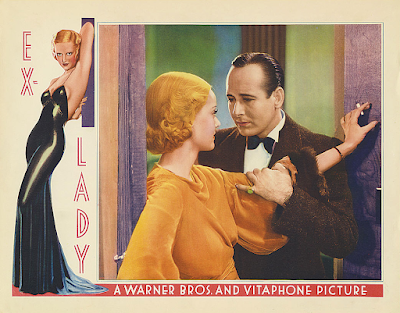


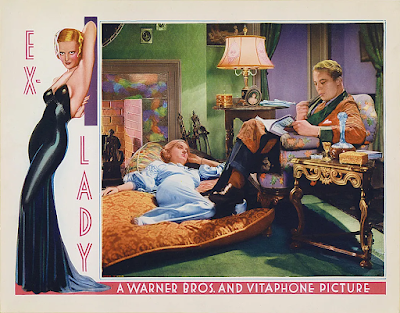





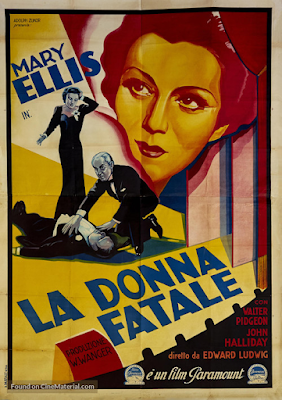


































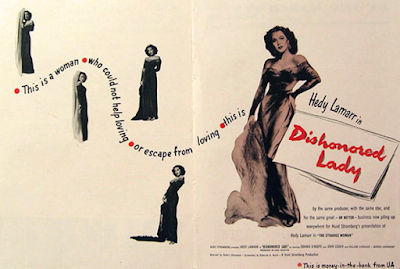



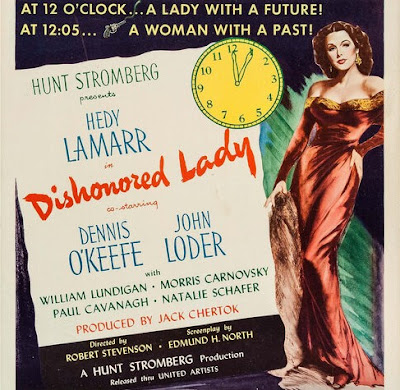



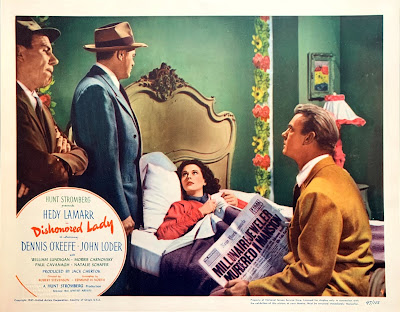







































2 comments:
Honey, you put Hedy Lamarrr and Bette Davis in a post and I cannot look away.
But Tallulah Bankhead!!!
XOXO
The most interesting thing about Bankhead is that she wasn't your standard beauty queen of the period - she had a bit of an odd look to her, but she became a huge star.
Post a Comment